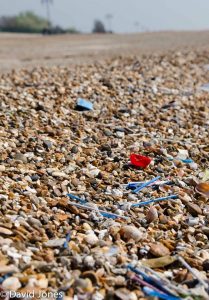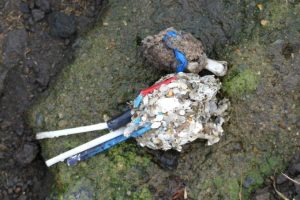
Cotton buds polluting a beach, washed up in the tideline
Scotland bans plastic stemmed cotton buds in a bid to rid beaches of single use plastic
Plastic stemmed cotton buds are set to be replaced with paper ones after new Scottish legislation to ban this single use plastic comes into force on Saturday. In fact, the first country in the UK to do so. Often flushed down toilets, cotton buds have been washing up beaches in their thousands for decades and have been found in the stomachs of seabirds and turtles. The ban is good for wildlife but also marks success for Fidra. Our team persuaded manufacturers and retailers to switch from plastic to less damaging paper stems, and worked with legislators to make the case for change. This led to a Scottish Government consultation in 2018, which saw overwhelming public support for a ban on plastic-stemmed cotton buds.
A cause for celebration
In just 2 days, all the work that has taken place as part of The Cotton Bud Project over the past 5 years will not have been in vain. On the 12th of October legislation banning the sale and manufacture of plastic stemmed Cotton Buds in Scotland, The Environmental Protection (Cotton Buds) (Scotland) Regulations 2019, comes into force and will mark the turning point in the fight against unnecessary plastic use. A cause for celebration.
This may not be the systemic change some people are rightly calling for, but it is undoubtedly an important step in the right direction which will make a difference to wildlife and marks a change in the way companies and legislation view plastic. A win for the environment and for business. A win for our sewage systems and a win for the seabirds, turtles, fish and numerous other marine wildlife on our shores and in our oceans.

(C) Maggie Sheddan – Cotton buds in regurgitated gull pellet
From bathroom to beach
Back in 2013 when we started to work on the issue of plastic stemmed cotton buds, it was on the back of behaviour change campaigns that failed to deliver lasting results. Increasing evidence was showing that single use plastic items such as the Plastic Cotton Bud were continuing to be improperly disposed of down toilets, ending up in our oceans on our beaches and in wildlife. It was a social and political environment that had not yet woken up to the issue of marine plastic pollution.
Thanks to the work of Dr Clare Cavers and colleagues working on the project here at Fidra, effective and persistent industry engagement led to market leaders such as Johnson & Johnson Ltd committing to switch from plastic to paper stems. By 2016 most other large retailers followed suit and now it is nearly impossible to find a plastic cotton bud in major supermarkets today. This was an example of effective corporate change and led to increased awareness of plastic pollution. Fidra’s Cotton Bud Project paved the way for change around how we see and value plastic.
Citizen science adds evidence
Key to the success of Fidra’s work has been working with scientists to demonstrate the impact of cotton buds on wildlife and the data collected by Marine Conservation Society’s volunteers showing their was a plastic problem on our beaches. In 2018 the Great British Beach Clean found 21.2 cotton buds stems for every 100m of beach surveyed. The previous year it was 26.7 per 100m. It is too early to tell if this is evidence of already declining cotton bud pollution due to changes at industry level, but we hope that this is the beginning of a downward trend in beached cotton buds.
A thing of the past

New paper stemmed cotton buds will now be the only type of cotton buds commercially available in Scotland
This legislation will make these single use items, the epitome of a throw-away society, a thing of the past in Scotland.
Not only does it mean we will have less plastic entering our oceans, but this reduction in plastic is a step in the right direction towards a less CO2 intensive society; essential for essential for tackling climate change. Paper cotton buds have lower CO2 emissions during both the production and incineration[1], and their tendency to biodegrade will mean our marine environments will be healthier as a result.
A triumph for Scotland, for industry change, for the environment and for all those working towards changing the world for a better place. And, not to forget, a triumph for Fidra.
Check out our website to learn more about how The Cotton Bud Project helped create change and find out about our latest projects at www.fidra.org.uk/projects
[1] https://consult.defra.gov.uk/waste-and-recycling/plastic-straws-stirrers-and-buds/supporting_documents/Cotton%20Buds%20Impact%20Assessment.pdf
Tags: Cotton bud, legislation, plastic pollution, Scottish Government, single-use plastic
